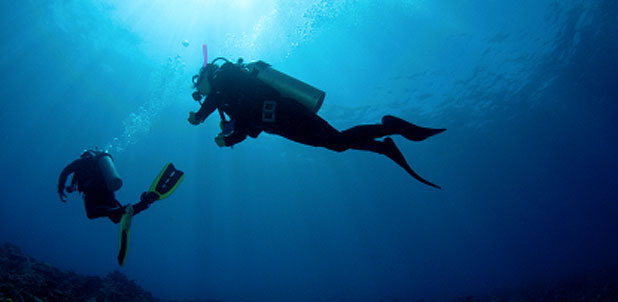Not only is it safer than diving alone, but sharing a dive with a partner multiplies the pleasure of the dive by having someone to share the experiences and verify the exciting encounters and sightings. I am lucky to have my wife Debbie as my dive buddy. She and I know each other’s dive habits. We work well together as a team, and we have become very adept at not only staying close together, but also being aware of each other’s position, activity. Should they arise, we can discuss issues throughout the dive.

Being a good dive buddy
Some people seem to think that getting in the water about the same time as your buddy, and staying in the same ocean as they are, constitutes buddy diving. They are wrong. To be a good dive buddy, someone with who other people enjoy diving and look for to diving with in the future, you should take being a buddy a bit more seriously.
A good dive buddy stays close to his or her dive partner all the time. Just how close varies with conditions like visibility, current, how well you know your buddy, whether you have dove together in the past, and other relevant factors. But on every dive, your should be close enough you can respond to your dive buddy in the event of any emergency or need for assistance arising. Emergencies are not limited to air depletion. They can include entanglement, equipment malfunction, injury, or even coming under attack from an aggressive sea creature. Stay close enough to help a buddy out.
Use situational awareness
A good dive buddy not only stays in close proximity to their dive partner, they are aware of their buddy’s location and activity, direction of travel if moving, and can perceive any problems, confusion, unease, or distress a buddy may exhibit as it occurs or just moments after. It doesn’t take long for buddies to become separated if they are not focused on and have an awareness of where each other is and what the other is doing and how they are moving. Buddy diving is kind of like going on a date. If you take a date to a dance, it is bad manners to lose them on the dance floor.
Good manners require that you pay attention to them. If you don’t, you might look up to find they are no where around. It’s the same in buddy diving. Pay attention to your buddy. Look around and mark your buddy’s’ location and activity regularly, in fact, often, and better still, constantly.
Know your buddy
Part of being a good dive buddy is being sensitive to your dive buddy’s feelings, including how he or she feels physically and whether they are feeling stressed or anxious about doing a dive. Don’t pressure your buddy to do a dive that they don’t want to do. Sometimes a diver is not comfortable doing a dive. Let it go. Similarly, if a problem arises during a dive that leads to one buddy wanting to terminate, or “thumb” the dive, a good dive buddy will go with them. Never leave a distressed, injured, confused, stressed out, or tired buddy to fend for themselves, even if they are surfacing and returning the boast or shore.
A good dive buddy will get acquainted with his diving partner before the dive. Sometimes we get paired up with a stranger, what some call an “insta-buddy.” When that happens, you need to get to know each other as divers. Talk to each other. Learn about each other’s experience level and last dive. Clarify the communications you will use and agree as to proximity and other buddy coordination. Discuss your objectives for the dive. Are you going to swim around like crazy people or focus on looking at the animals?
Discuss roles
If one or both are going to take pictures or video, discuss expectations you each have for staying close. When diving with someone new (or any buddy for that matter) a good dive buddy will do a pre-dive safety check. Familiarize yourself with your buddy’s equipment, just like you learned in basic scuba certification class. There is no need to dive with a stranger if you take a few minutes to plan together.
Too often, divers who are paired up by the divemaster or boat captain, or even those who may have selected each other as buddies, will introduce themselves to each other, and then be oblivious to each other throughout the dive. That is not a good idea. A dive buddy who appreciates the importance of that role will stay close. He will be aware of what is going on, never have a problem with buddy separation, and be there to share air, help his buddy get untangled from the kelp, notice symptoms of narcosis, and otherwise assist as needed. If you want to have a good dive buddy, be a good dive buddy. You can do it. I know you can.

